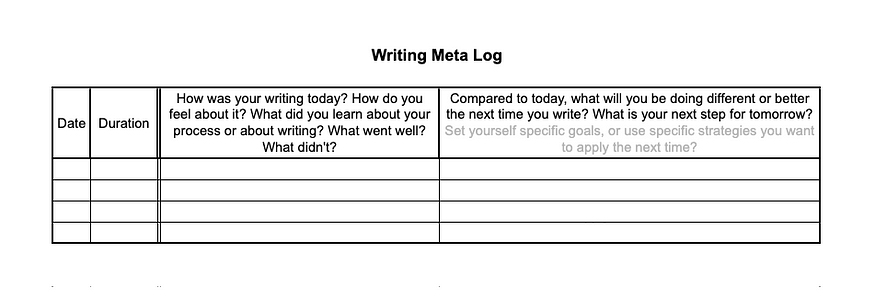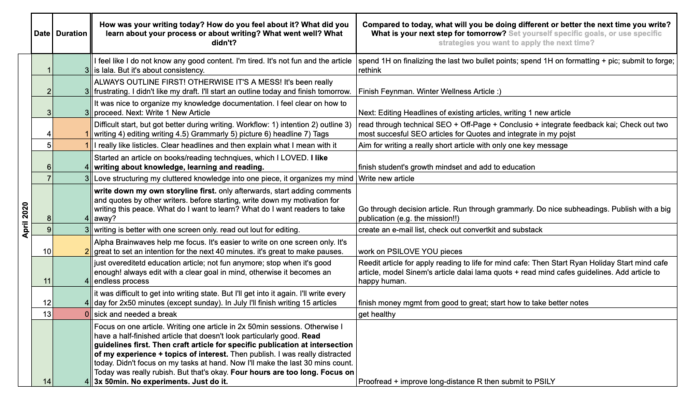And build a loyal online audience.

Writing consistently is the most important yet hardest part of building an online audience.
If you’re starting out, you’re writing in the void. You feel as if nobody is interested in your work. You start to question why you’re even spending the time on it.
I’ve almost given up hundreds of times. I’ve spent months in the process, not knowing whether my writing will ever attract readers. I’ve written 40 articles before my first story went viral back in 2020.
Fast forward two years, and I have an email list of +4K subscribers and +27K followers on Medium.
Most writers give up when they don’t see much traction. If you really want to build an online audience, don’t be one of them.
If you can keep writing when no one seems to bother about your work, the odds are high that you’ll attract an online audience one day.
In the last 2 years, I’ve kept writing and improving. The strategies below are the ones that have helped me the most. They can help you stick to writing too.
1. Knowing that attracting an audience isn’t linear
Most writers hope that after they’ve published their first or second article, people will read it. For all of the about 50 successful online writers I’ve talked to in the past two years, this was not the case.
Sinem Günel helped me start with the right mindset — don’t expect anything all before I’ve written and published 100 articles.
I wanted to give myself that range to try, fail and figure out what works and what doesn’t.
Because the thing is, success in writing isn’t linear. If you keep writing a lot, you’ll likely experience sudden growth. One of your articles will get traction and tens of thousands of people will read it.
Having the idea of exponential growth in the back of my mind saved me.
I know it feels lonesome to keep writing when nothing happens. You can get anxious, stressed, and desperate. All your feelings are valid.
But if you hang in there and keep up with a consistent writing practice long enough and keep learning and improving (with the strategies outlined below), more and more people will discover and read your work.

2. Knowing your why
The second thing that helped me become a consistent writer was knowing why I write.
My why changed.
When I started, I wrote a very vague why in my bullet journal: “I want to be a writer. I’ll sit down and write every day.”
Some weeks in, I learned more about what really motivated me and added: “I write because it’s the best learning habit. I want to support others. I write because I want to make a full-time income through writing.”
It doesn’t matter why you start but knowing the reason why you want to spend time writing will help you stick with it in the long run.
You have a lot of competing priorities in your life — your job, hobbies, friends, and family. So why do you want to spend your precious time writing online?
3. Write what you’re curious about
Initially, I forced myself to write about topics that were popular on this platform at that time — productivity, finance advice, and relationship habits.
My writing motivation vanished. Sitting down to write became harder and harder. I almost stop.
It wasn’t until I allowed myself to follow my curiosity that writing became joyful again.
If you’re passionate about a topic, your readers will notice. Within the right framing (great headline, solid introduction, clear and reader-centric story structure), you can make even the most niche topic interesting.
For example, I was deeply fascinated by the Zettelkasten technique and how to apply it in RoamResearch. I wrote a guide about it. The article attracted +16K readers, led to 512$ earnings, and about ten clients that requested a 1-on-1 session to get coached on their knowledge management.
I would’ve never written that article if I hadn’t followed my curiosity.
I still stick to this principle. When I looked at my idea board on xTiles this morning, I thought, “What am I curious about? Which topic would I like to explore?” I then chose the metaverse and education.
Even though your niche isn’t among the popular topics, you can make it work by making it helpful for the reader.
If you want to write consistently, write about what you want to learn or think about.
4. Being your biggest cheerleader
Now, this advice might seem weird. But I’m sharing it because it’s one of the factors that has helped me a lot.
When I started writing, I prepared a motivational audio recording. I talked about why I want to be a writer and how it’ll feel once I’ve attracted an audience. I told myself what I must do daily to achieve this (sit down before work every morning for two hours no matter what).
In the first months of writing, I listened to that audio almost every day.
Self-recorded affirmations can become a powerful motivator. You don’t even have to believe in positive thinking, etc. Recording yourself can serve as a reminder, and anchor, to prioritize what you want to do.
5. Keep on learning
You can only improve your writing if you write. Don’t get lost in reading or learning about writing instead of doing the work.
But once you do have a regular writing habit, learning from the people who’ve already done it can level up your writing practice.
These are the most useful books I’ve read are about writing:
- On Writing: A Memoir of the Craft by Stephen King
- Bird by Bird: Some Instructions on Writing and Life by Anne Lamott
- The Art and Business of Online Writing by Nicolas Cole
Taking writing courses can further accelerate your writing skills. I took courses by Tim Denning, Sinem Günel, Niklas Göke, and Tom Kuegler. And I’m glad I learned from the people who’ve walked the talk.
But the most important thing is to sit down and actually do the writing.
That’s why I created the outcome-focused online course where you learn and write. In the Writing Online Accelerator, you don’t only sit in front of pre-recorded videos. You’re part of a highly-motivated peer group.
I and two other editors will give you 1-on-1 feedback. By the end of the course, you’ll have 3 high-quality articles online. If you want a free sneak peek into the material, subscribe for my free workshop here.
6. Build support groups and learn from others
To make writing less lonesome, reach out to fellow writers and start a group where you exchange ideas, help each other with headline practice, or even edit each other’s articles.
I’ve relied on multiple slack groups in the last two years, which have been extremely helpful in my journey.
Whenever you read something from the writers you like, tell them. Comment on their articles and share what you love about their work. Connect on LinkedIn or other social media platforms, offer help, and ask for their advice.
7. Have a metalog
If I had to name one tool that has kept me going and improved my writing it’s the meta log. It will support you in establishing a deliberate, consistent writing practice that will make you a better writer.
I’ve invented this tool to improve my writing while keeping my motivation. The meta log is rooted in metacognition, a skill essential for learning, according to educational scientists.
According to research, three steps are necessary for unlocking your metacognition: planning, monitoring, and evaluating.
I’ve built the meta log with these principles in mind, which can help you build a consistent, deliberate writing practice.
Here’s my template:

Fill a line every time you finish your practice.
If you use it consistently, you’ll discover a pattern and see which topics flow well and which are the ones you don’t prefer that much.
Three principles for using the meta writing log:
- Write this for yourself. It can be messy.
- The longer you keep collecting data, the more useful it will be.
- Bold your key insights to highlight your critical lessons.

Remember the essence
It’s challenging to write consistently in the long run. But you can build up your unique support system to help.
The following things kept me on my journey:
- Knowing writing is exponential
- Being aware of why I write
- Reading and listening to my affirmations
- Continuously learning and improving
- Reaching out to fellow writers
- Relying on my support groups on slack
- Having a meta-writing log
Take what feels right and ignore the rest. Not all these things will work. Experiment to find a way that supports you to write consistently.
Ready to accelerate your writing journey and build an online audience?
Subscribe for a free 5-day course on how you can set up the single most important thing writers usually forget to attract a large audience online. With a total time investment of only 20 minutes.